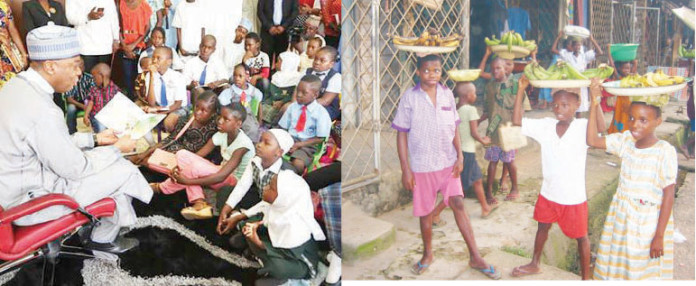With the theme of this year’s Children’s Day as ‘Violence Against Children: Addressing the Challenges’, Senior Correspondent, ONYEWUCHI OJINNAKA, takes another look at the Child Rights Act, its compliance and enforcement, among others.
On Friday, May 27, children and youths in the 36 states of the federation joined their counterparts across the world to celebrate the International Children’s Day. Though the date varies from one country to another, the aims and theme are the same.
The 2016 Children’s Day which theme is ‘Violence Against Children: Addressing the Challenges’ is aimed at addressing the issue of various forms of violence on the Nigerian child and asserting the child’s right.
Child Rights Act
In 2003, Nigeria adopted the Child Rights Act to domesticate the convention on the rights of the child. Interestingly, the Child Rights Act was passed by the federal government and the state governments followed suit. So far, only 23 states of the federation have domesticated the Act, while 12 states and the Federal Capital Territory (FCT) are yet to comply. With this yet-to-be-accomplished legislation, pundits opine that this landmark legislative achievement has not yet crystallised into improved legal protection of children throughout the federation. They posit that the Act will only be effective if Houses of Assembly enact it. To ensure full domestication, they added that there must be continuous intensive canvassing and advocacy in other states that are yet to pass the law.
The Child Rights Act, which has been signed, ratified and domesticated by Nigeria, urges parties to prohibit and prevent child sexual abuse or violence. Under Article 19, parties are obliged to take all appropriate legislative, administrative social and educational measures to protect the child from all forms of physical or mental violence, injury or abuse, neglect or negligent treatment, maltreatment or exploitation, while in the care of parents, legal guardians, or any other person cares for the child. By virtue of Article 34, states undertake to protect the child from all forms of sexual exploitation and sexual abuse. The Act was enacted to give legal protection of children from all forms of violence through the domestication of National Child’s Rights Act.
The latest state to pass the Act is Bayelsa. With the signing of the bill into law by Governor Henry Seriake Dickson, any form of violence against children is now a criminal offence.
The Act spelt out the role of every stakeholder in preventing and responding to violence against children such as using children for labour and hawking, sexual assault, rape and defilement. Others include inflicting bodily harm, physical torture, confinement, starvation, intimidation, harassment, stalking, deprivation and educational denial, among others. These are widespread across the country.
Civil groups/activists speak
While felicitating with children on their day, Abuja-based rights group, National Council of Child’s Rights Advocates of Nigeria (NACCRAN), urged the remaining 12 states that have not passed the Child Rights Act to do so for effective implementation and enforcement across the country.
The council comprising civil society groups and non-governmental organisations (NGOs) in a briefing, said that “Nigeria must develop a robust plan to combat growing violence against children.
Ambrose-Kennedy Yibin, Operations Manager for ‘Save the Children’, which is part of a coalition under NACCRAN, pointed out that a survey by the National Population Commission (NPC) in 2015 showed that six out of every 10 Nigerian child experienced some form of physical, emotional and sexual violence before the age of 18.
In a rally across the 12 states that have not complied with the Act, the coalition protested violence against children, the need to protect them under legislation and to ensure their education.
Abdullahi Sale of the Civil Society Coalition for Education for All (CSCEFA) told TheNiche that education of parents and the society as well is crucial for the protection of children.
He said: “For now, the bill is not passed; lawmakers are not saying anything about the Sustainable Development Goals (SDGs) which states that each child must have free compulsory education up to senior secondary school (SSS 3), and so I cannot say much is being done.
“We hope to make a strong point that policy matters should quickly act.
“The bill should be passed. Money should be made available. Schools should be built and teachers should be trained, so that better result will be achieved.”
In Lagos, the Focal Person for West African Women Association (WAWA), an affiliate of Economic Community of West African States (ECOWAS), Dr. (Mrs.) Beatrice Ubeku, challenged the federal and state governments to prove that Nigerian children are future leaders.
Ubeku told TheNiche that for many years, what happened on Children’s Day was the usual march past under the scorching sun by children and long speeches by government officials.
In her briefing at the ECOWAS building, Onikan, Lagos, she disclosed that in this year’s Children’s Day celebration, WAWA moved away from the usual practice by organising a debate and quiz competition open to all schools. She called on elected and appointed officials to take the plight of children more seriously, urging the officials to discard the old system of parades and salutations. “We expect that every May 27, federal and state governments should tell Nigerians what they have done for our children in the past year.”
At a time, children in other developing countries have adequate welfare, access to education and so on, and now is the time for our leaders to ensure that speeches are minimised while the main work is maximised,” she said.
In the same vein, WAWA secretary, Mrs. Hauwa Sodehinde, disclosed that the association would later in the year distribute free books to schools and communities nationwide.
“The book will further enlighten our kids on what is right and wrong, how they can take care of themselves, protect themselves from violent persons, avoid bad companies and social vices among others,” she said.
Speaking on the abducted school girls from Chibok, Sodehinde expressed the hope that one day they will regain their freedom.
“What should be on our minds is re-integrating our girls into the society. The girls would face discrimination, thus, government and all Nigerians must be ready to bear the responsibility of looking after them,” Sodehinde charged.
Women’s Consortium of Nigeria (WOCON), an NGO that promotes and enforces the rights of women and children, told TheNiche that it was working with its partners in all the states to ensure that House of Assembly that are yet to pass the bill do so for the benefit of the children.
Coordinator of the organisation, Olukunle Adeogun, noted that most of the states “have actually passed the bill”, hoping that by the end of this year, other states would have conformed.
WOCON, in collaboration with Child Protection Network, in the instance of United Nations Children’s Fund (UNICEF) organised activities for children at Ijebu Ode in Ogun State, followed by a visit to one of the motherless babies’ homes also at Ijebu.
Unenviable stats
Findings by the National Population Commission (NPC) with support from the United States Centre for Disease Control and Prevention and UNICEF, which was released in September 2015, showed that six in every 10 children suffer violence; one in two suffers physical violence; one in four girls and one in 10 boys suffer sexual violence; and one in five boys and one in six girls suffer emotional violence.
Nigeria has been unable to tackle several issues militating against the protection rights of her children, such as children living and sleeping in the streets, under bridges, children affected by communal clashes or insurgency, drug abuses, human trafficking and the lapses of the juvenile justice system. Children in conflict with the law for various reasons, poverty, social inequality, moribund educational system, family problems, peer pressure, social and religious conflicts where children are used as foot soldiers are some of the factors which account for the number of children in conflict with the law.
Analysts posit that these juvenile delinquents are most often treated like adults and mixed with adults in prisons. They lamented that many of them were most times convicted and jailed without making contact with a social worker or giving them the opportunity to be heard.
Survey
A survey by TheNiche on the Orile-Iganmu portion of Lagos/Badagry expressway, Oshodi, Ajegunle and Oyingbo areas of Lagos revealed that despite the enactment of the Child’s Right Act, girls and boys between the ages of six and 16 were always on the highways and streets, hawking one item or another and nobody seemed bordered. While some shouted for patronage to their wares, others, mostly between 10 and 16 years, would sit at one dark corner doing one untoward thing or another, and nobody seemed to be concerned.
The social workers, whose duty is to enforce the law by arresting these child hawkers and charge them to the juvenile court, are docile. A social crusader, Adetunji Balogun, said that “the failure or success of the Child Rights Act depends on its enforcement” or otherwise.
Remedies
Activists posit that increased participation of children in issues affecting their lives can make positive impact on their health and socio-economic conditions, adding that when children are involved in decision-making, they tend to be more pro-active, creative, positive and energetic, offering positive ideas devoid of prejudices.













